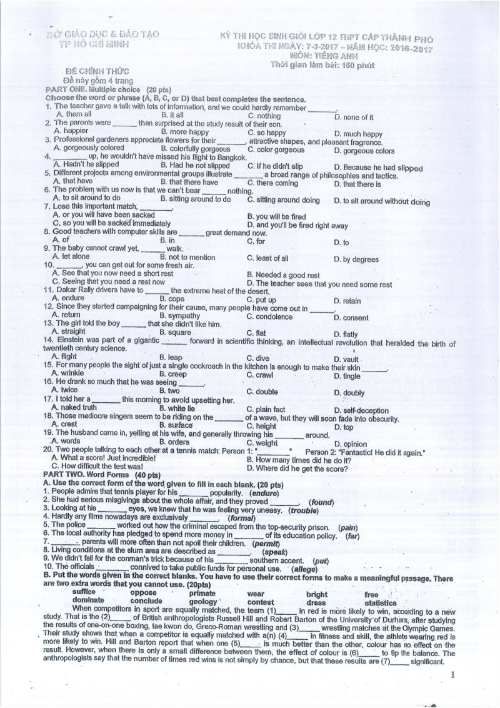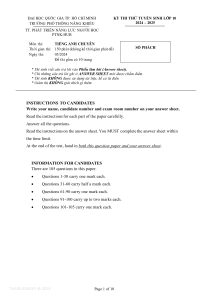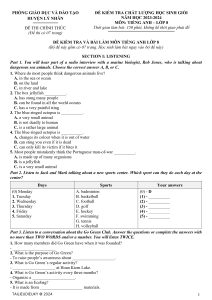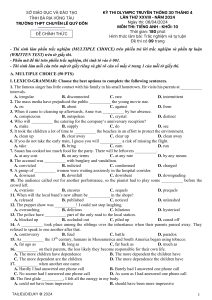Đề thi chọn học sinh giỏi lớp 12 THPT cấp thành phố (TP Hồ Chí Minh) năm học 2016-2017 môn Tiếng Anh là tài liệu quan trọng cho các bạn học sinh lớp 12 THPT đang chuẩn bị ôn tập để thi vào đại học.
Tài liệu này được chuẩn bị bởi Sở Giáo dục và Đào tạo TP Hồ Chí Minh, với mục đích giúp các bạn học sinh lớp 12 cải thiện kỹ năng Tiếng Anh của mình và chuẩn bị cho kì thi chọn học sinh giỏi. Tài liệu này bao gồm các đề thi chọn học sinh giỏi môn Tiếng Anh cấp thành phố TP Hồ Chí Minh trong năm học 2016-2017.
Các đề thi này được thiết kế để đánh giá khả năng đọc hiểu, ngữ pháp và từ vựng của các bạn học sinh lớp 12 THPT. Các đề thi được sắp xếp theo thứ tự từ khó đến dễ, giúp các bạn học sinh có thể thử sức và nâng cao khả năng của mình.
Ngoài ra, tài liệu này còn cung cấp đáp án chi tiết và lời giải thích, giúp các bạn học sinh có thể tự kiểm tra kết quả và hiểu rõ hơn về từng câu hỏi. Với tài liệu này, các bạn học sinh lớp 12 THPT sẽ có cơ hội ôn tập và nâng cao kỹ năng Tiếng Anh của mình.
Đồng thời, tài liệu cũng giúp các bạn làm quen với các dạng đề thi và kiểm tra năng lực của mình trước kỳ thi chọn học sinh giỏi môn Tiếng Anh. Nếu bạn đang tìm kiếm tài liệu ôn thi Tiếng Anh cho kỳ thi chọn học sinh giỏi lớp 12 THPT, Đề thi chọn học sinh giỏi lớp 12 THPT cấp thành phố (TP Hồ Chí Minh) năm học 2016-2017 môn Tiếng Anh là một tài liệu hữu ích không thể bỏ qua.
Trích dẫn nội dung "Đề thi chọn học sinh giỏi lớp 12 THPT cấp thành phố (TP Hồ Chí Minh) năm học 2016-2017 môn Tiếng Anh":
SỞ GIÁO DỤC ĐÀO TẠO ĐI CHÍNH THỨC Đề này gồm 4 trang PART ONE. Multiple choice (20 pts) KỲ THI HỌC SINH GIỎI LỚP 12 THPT CẤP THÀNH PHỐ KHÓA THI NGÀY: 2017 HAI HỌC: 2016 2017 KHÔN: TIẾNG ANH Thời gian làm bài: 150 phút Choose the word or phrase (A, B, C, or D) that best completes the sentence. 1. The teacher gave a talk with lots of information, and we could hardly remember A. them all 2. The parents were A. happier B. it all C. nothing than surprised at the study result of their son. B. more happy 3. Professional gardeners appreciate flowers for their 4. A. gorgeously colored B. colorfully gorgeous up, he wouldn't have missed his flight to Bangkok. A. Hadn't he slipped 5. Different projects among A. that have B. Had he not slipped environmental groups illustrate B. that there have 6. The problem with us now is that we can't bear A. to sit around to do 7. Lose this important match; A. or you will have been sacked C. so you will be sacked immediately 8. Good teachers with computer skills are A. of B. in walk. D. none of it D. much happy attractive shapes, and pleasant fragrance. D. gorgeous colors D. Because he had slipped a broad range of philosophies and tactics. D. that there is C. so happy C. color gorgeous C. If he didn't slip C. there coming nothing. B. sitting around to do C. sitting around doing D. to sit around without doing B. you will be fired D. and you'll be fired right away great demand now. C. for D. to C. least of all D. by degrees B. Needed a good rest D. The teacher sees that you need some rest C. put up D. retain B. sympathy that she didn't like him. B. square B. leap C. condolence D. consent C. flat D. flatly 14. Einstein was part of a gigantic twentieth century science. A. flight forward in scientific thinking, an intellectual revolution that heralded the birth of C. dive D. vault. 15. For many people the sight of just a single cockroach in the kitchen is enough to make their skin A. wrinkle 9. The baby cannot crawl yet, A. let alone 10. B. not to mention you can get out for some fresh air. A. See that you now need a short rest C. Seeing that you need a rest now 11. Dakar Rally drivers have to A. endure the extreme heat of the desert. B. cope 12. Since they started campaigning for their cause, many people have come out in A. return 13. The girl told the boy A. straight B. creep C. crawl 16. He drank so much that he was seeing A. twice B. two C. double 17. I told her a A. naked truth this moming to avoid upsetting her. B. white lie C. plain fact D. tingle D. doubly D. self-deception 18. Those mediocre singers seem to be riding on the B. surface of a wave, but they will soon fade into obscurity. C. height D. top A. crest 19. The husband came in, yelling at his wife, and generally throwing his .A. words B. orders C. weight 20. Two people talking to each other at a tennis match: Person 1: A. What a score! Just incredible! C. How difficult the test was! PART TWO. Word Forms (40 pts) D. opinion around. Person 2: "Fantastic! He did it again." B. How many times did he do it? D. Where did he get the score? A. Use the correct form of the word given to fill in each blank. (20 pts) 1. People admire that tennis player for his popularity. (endure) (found) 2. She had serious misgivings about the whole affair, and they proved eyes, we knew that he was feeling very uneasy. (trouble) nowadays are exclusively 3. Looking at his 4. Hardly any films 5. The police (formal) worked out how the criminal escaped from the top-security prison. (pain)
6. The local authority has pledged to spend more money in 7. of its education policy. (far) parents will more often than not spoil their children. (permit) 8. Living conditions at the slum area are described as 9. We didn't fall for the conman's trick because of his (speak) 10. The officials. southern accent. (put) connived to take public funds for personal use. (allege) B. Put the words given in the correct blanks. You have to use their correct forms to make a meaningful passage. There are two extra words that you cannot use. (20pts) suffice dominate oppose conclude primate geology wear contest bright dress free statistics When competitors in sport are equally matched, the team (1) in red is more likely to win, according to a new study. That is the (2) of British anthropologists Russell Hill and Robert Barton of the University of Durham, after studying the results of one-on-one boxing, tae kwon do, Greco-Roman wrestling and (3) wrestling matches at the Olympic Games. Their study shows that when a competitor is equally matched with a(n) (4) in fitness and skill, the athlete wearing red is more likely to win. Hill and Barton report that when one (5) is much better than the other, colour has no effect on the result. However, when there is only a small difference between them, the effect of colour is (6) anthropologists say that the number of times red wins is not simply by chance, but that these results are (7) to tip the balance. The significant. 1 Joanna Setchell, a(n) (8) carrying out some primate research at the University of Cambridge, has found similar results in nature. She studies the large African monkeys known as mandrills. Mandrills have bright red noses that stand out against their white faces. Setchell's work shows that the (9) males the ones who are more successful with females - have a(n) (10)____ red nose than other males. Setchell says that the finding that red also has an advantage in human sporting events does not surprise her and she adds that 'the idea of the study is very clever.' PART THREE. CLOZE TESTS (90 pts) Read the passage and choose the best option (A, B, C or D) for each blank space. PASSAGE A (15 pts) After many decades of television, it might seem only obvious to conclude that it is here to (1). There have been many (2) to it during this time, of course, and on a variety of (3) Did it cause eye strain? Was the screen bombarding us with radioactivity? Did the advertisements contain (4) messages, persuading us to buy things we didn't really need? Did children turn to (5) through watching it, maybe because so many programs taught them how to shoot, rob and kill, or because they had to do something to (6) the hours they had spent
(7). to the tiny screen? Or did it simply create a vast passive audience drugged by glamorous serials and inane situation (8) ? On the other hand, did it increase anxiety by sensationalizing the reality for the news which was (9)______ by unsuitable pictures), and fill our living rooms with war, famine and political (10) ? All'in all, television proved to be the all-purpose scapegoat for the second half of the century, (11) for everything, but above all, eagerly watched. For no (12) how much we despised it, feared it, were bored by it, or felt that it took us away from the old (13) (14) of family conversation and hobbies such as collecting stamps, we never turned it off. We was in it if we looked carefully. staring at the screen, aware that our own tiny (15) 1. A. long. 2. A. controversies 3. A. reasons 4. A. subliminal 5. A. debility B. stay B. commitments B. causes B. reasonable B. illusion C. exist C. objections C. purposes C. legal C. threat C. devalue C. glued 6. A. counteract 7. A. dedicating B. contradict B. caught 8. A. comedies B. programs C. weepies 9. A. taken B. presented B. unrest C. depression B. accused C. blamed 10. A. problem 11. A. broadcast 12. A. way 13. A situation 14. A. agreed 15. A. realism PASSAGE B (15 pts) B. matter B. custom B. accepted B. reflection C, shown C. difference C. practice C. turned C. consciousness D. be D. arguments D. grounds D. influenced D. violence D. self-correct D. tense D. newsreels D. accompanied D. regime D. ready D. reason D. paradise D. kept D. miniature Autism is a(n) (1)________ disease which prevents those who suffer from it from (2) 4 with the outside world. Victims seem to live in a world of their own which, even now, doctors are unable to penetrate. The illness was first given a name in 1943, and yet doctors have (3) very little progress in their understanding of the disease since then. According to statistics, between two and four children (4) every 10,000 are born autistic. Often, victims are not (5) to speak, read or write. But what is most extraordinary about the illness is (6) in other areas, many of the children can perform almost superhuman (7). of the brain. One of the common skills these so-called idiot (8) have is calendrical calculation, (9) the ability to say which day of the week a particular date falls on. Jackie, (10), who is now 42, could do this from the age of six, when she first began to talk. She can tell you which day of the week it was on December 24, 1933 with scarcely (11) But if you ask her how she does it, she will say she does not know. Leslie Lemke only has to (12). a piece of music once, and he can play it back on the piano note-perfect. Yet he has never had any (13) musical training, and he is blind and has an IQ of 58. Stephen Wiltshire has exceptional artistic talents; and, (14) both Jackie and Leslie, combines these talents with a remarkable memory, and can draw buildings with (15) 1. A. physical 2. A. talking 3. A. got B. respiratory B. saying B. done B. between
4. A. out of 5. A. inclined 6. A. the fact that 7. A. triumphs 8. A. geniuses B. capable B. feats architectural accuracy. C. mental C. exchanging C. made D. artery D. communicating D. claimed D. among D. able C. from C. keen B. the truth that C. in fact D. the reality that C. achievements D. activities B. servants C. prodigies D. savants B. it is C. that is B. for certain C. for instance 9. A. this is 10. A. as a case 11. A. a moment hesitation 12. A. listen 13. A. ongoing .14. A. as 15. A. full D. such as D. as an example B. a moment's hesitation C. a momentum hesitation D. a momentary hesitation B. heed C. sound C. legal C. like D. hear D. physical B. formal B. similar B. complete C. thorough Fill in each of the blanks in the following passage with ONE suitable word. PASSAGE C (30 pts) D. the same D. entire There are obstacles to take up of ICT by older populations (1) in a reduction in ICT skills in older age (2)____ There are a number of possible explanations for this drop-off in technology use. ICT content is mostly (3) at younger people. Perceptions of the affordability of ICT (4) to be rooted in long-established spending patterns, and many older people-regardless of income-perceive ICT to be a (5). Poor access to adequate broadband can exclude older people. For example, only about 25% of registered care homes in the UK (6) internet access to residents. More generally, older people disproportionately live in (7) areas which often have poorer levels of internet speed. The figure (8) that of the 9 areas in the UK with poorest levels of internet speed, 8 have an older population above the English national (9) action to ensure that The authors argue that public bodies and third sector organisations may need to (10) desired ICT access is not denied to (11) or some older people because of actual or perceived unaffordability, or because of (12), sensory or cognitive decline. Care settings should particularly pay more (13) to the ICT-related preferences of 2 the people they support. arrangers; it also tended to increase commercialism in the transmission (the "distribution") of popular music to its audience. Thus, the era of the American popular music industry was bom an inevitable result of the electronic age's "mass media" (though the term was not yet coined). New York City was the center of the popular music industry during the 1920's: it had Broadway and Schubert Alley, center of the American popular musical theater, and it had Tin Pan Alley, center of the songwriting business and the still- powerful sheet music publishers.
The recording studios and radio networks were also based in New York. In addition, recordings and radio opened up new possibilities for a striking new development. They made available kinds of popular music heard previously only in limited geographical areas or by specific ethnic and social groups - especially the blues, gospel songs, and jazz of African Americans and the traditional music of the southern Appalachian Mountains and other rural areas of the southern and western United States. The latter music was not to affect the mainstream of American popular music until much later, but the former influenced American popular music of the 1920's in many ways. In fact, novelist F. Scott Fitzgerald could even call the era "The Jazz Age" - which reflected the inroads of African American musical influence on the nation at large. 1. What aspect of music in the 1920's in the United States does the passage mainly discuss? (A) The growth of musical theater (C) Technological advances in sound recording for films 2. The word "establishment" in line 2 is closest in meaning to (A) necessity (B) formation (B) The effect of technology on the popular music industry (D) The influence of professional songwriters on popular music (C) connection 3. Which of the following is NOT mentioned as a technological development of the 1920's? (A) The public-address system (C) Magnetic recording tape. (B) Film sound tracks (D) enrichment (D) The electrical recording process 4. According to the passage, what was the importance of the microphone and the sound amplifier mentioned in paragraph1? (A) They caused major changes in the creation and performance of popular music. (B) They helped the performance of people who were not professionals. (C) They were used to preserve a historical record of older styles of music and performance. (D) They helped performers meet audience demand for louder music. 5. The word "consequently" in line 4 is closest in meaning to (A) otherwise (B) in fact 6. The word "it" in line 8 refers to the (A) audience (B) process 7. The word "heighten" in line 8 is closest in meaning to (A) consider (B) announce ~ (C) therefore (D) although (C) importance (D) commercialism (C) increase (D) adjust 8. Why does the passage mention New York City in paragraph 2? (A) It was a major center for the invention of new technology. (B) It had a significant concentration of performing, composing, and music business activity. (C) It had the broadest range of audiences of any city in the United States. (D) It was the source of a popular regional style of music. 9. What is the new development that the author discusses in paragraph 3? (A) A blending of traditional musical styles occurred. (B) Popular music performers began to avoid using elements of traditional music. (C) The center of the recording industry moved south. (D) Music styles formerly known only to a few people became known to many people. 10. The word "era" in line 19 is closest in meaning to (A) period (B) nation PART FIVE: SENTENCE TRANSFORMATION (C) movement (30 points) (D) book Rewrite each sentence in such a way that it means almost the same as the one printed before it. Use the word in brackets without making any change to it. 1. He managed to make the world believe his fantastic story of having got to the North Pole alone. (fall) → The world 2. He couldn't stop looking at the pictures on the wall. (hanging) →He couldn't take 3. I always find those chess problems quite impossible. (defeat) →Chess problems 4. Give in to him and you will regret it. →You'd better (stand) 5. Many women are ready to do anything to lose weight. (lengths) Many a 6. With six children to look after, she's extremely busy. (hands) →She has 7. He had asked for the girl's hand without his parents' knowledge. (marriage) His parents were 8. What I had done ruined my chances of promotion. (paid) As a 9. "Oh! Don't complain all the time!" says Mike to his friend. (stop) →Mike wishes 10. It is really bad to become ill during your holiday abroad. (taken) →There's nothing
THE END OF THE TEST 4 SỞ GIÁO DỤC & ĐÀO TẠO TP HỒ CHÍ MINH KỲ THI HỌC SINH GIỎI LỚP 12 THPT CẤP THÀNH PHỐ KHÓA THI NGÀY: 7-3-2017 - NĂM HỌC: 2016-2017 MÔN: TIẾNG ANH KEY PART ONE. Multiple choice (20 pts, 1 point / correct answer) 1. B. it all. 2. B. more happy 3. D. gorgeous colors 4. B. Had he not slipped 5.D. that there is 6. C. sitting around doing 7. D. and you'll be ... 8. B. in 9. A. let alone 10. C. Seeing that you ... 11. A. endure 12. B. sympathy 13. C. flat 14. B. leap PART TWO. Word Forms (40 pts) A. (20 pts, 2 points / correct answer) 1. enduring 2. unfounded 3. troubled 4. formalistic 5. painstakingly 6. furtherance 7. Permissive (minus 1 if not capitalized) B. (20pts, 2 points / correct answer) 15. C. crawl 16. C. double 17. B. white lie 18. A. crest 19. C. weight 20. A. What a score! 8. unspeakable 9. put-on 10. allegedly (1) dressed (2) conclusion (3) freestyle (4) opponent (5) contestant (6) sufficient (90 pts) (7) statistically (8) primatologist (9) prominent (10) brighter PART THREE. CLOZE TESTS PASSAGE A (15 pts, 1 point / correct answer) 1. B. stay 2. C. objections 3. D. grounds 4. A. subliminal 5. D. violence 6. A. counteract 7. C. glued 8. A. comedies 9. D. accompanied 10. B. unrest PASSAGE B (15 pts, 1 point / correct answer) 1. C. mental 2. D. communicating 3. C. made 4. A. out of 5. A. inclined 6. A. the fact that 7. B. feats 11. C. blamed 12. B. matter 13. D. paradise. 14. D. kept 15. B. reflection 8. D. savants 9. C. that is 10. C. for instance 11. B. a moment's 12. D. hear 13. B. formal 14. C. like 15. B. complete ana PASSAGE C (30 pts, 2 points / correct answer) 1. resulting 2. groups 3. directed 4. seem/ appear 5. luxury. 6. provide / supply 7. rural 8. shows 9. average 10. take PASSAGE D (30 pts, 2 points / correct answer) 1. simply 2. own 3. factors 4. technologies 5. transmitted 6. over 7. reducing 8. individual 9. direction 10. services (20 pts) 11. all 12. physical 13. attention 14. networks 15. themselves 11. course 12. barriers 13. erected 14. experience 15. to PART FOUR.
Reading Comprehension PASSAGE A (10 pts, 1 point / correct answer) 1. (B) radical 2. (D) Vascular plants 3. (B) New life-forms on land ... 4. (C) removed 5. (C) They are older than ... PASSAGE B (10 pts, 1 point/correct answer) 1. (B) The effect of technology on ... 2. (B) formation 3. C Magnetic recording tape 4. (A) They caused major changes... 5. (C) therefore PART FIVE: SENTENCE TRANSFORMATION 6. (C) cases 7. (D) specimens 8. (B) trapped 9. (A) The time estimate for the first... 10. (A) The evolution of terrestrial life ... 6. (B) process 7. (C) increase 8. (B) It had a significant concentration ... 9. (D) Music styles formerly known.. 10. (Á) period (30 points, 3 points / correct answer) 1. → The world was made to fall for his fantastic story of having got to the North Pole alone. 2. → He couldn't take his eyes off the pictures hanging on the wall. 3. → Chess problems like those always defeat me. 4. → You'd better stand up to him, or (else) you will regret it. 5. →→ Many a woman goes (/ will go) to any/great/extreme lengths to lose weight. 6. → She has her hands full six children to look after (/looking after six children). 7. → His parents were not aware of (/ not informed about/of) his marriage proposal to the girl. // aware that he had proposed marriage to the girl. 8. →→ As a result/consequence of what I had done, my chances of promotion paid. 9. → Mike wishes his friend would stop all his complaints/complaining. 10. → There's nothing worse than being taken ill during your holiday abroad. THE END



